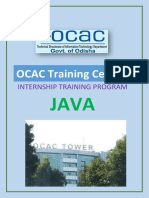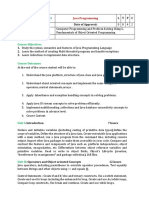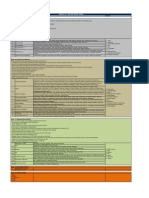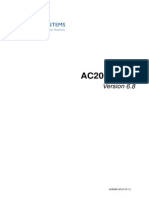Computer Programming 2 (JAVA)
Uploaded by
James JuanComputer Programming 2 (JAVA)
Uploaded by
James JuanCourse Title: Computer Programming 2 (Java)
Course Description: Java is one of the most widely used and versatile
programming languages in the world, powering everything from enterprise-level
applications to mobile apps and web services. This course is designed to provide
students with a solid foundation in Java programming, covering essential concepts,
techniques, and best practices for building robust and scalable software
applications.
Course Objectives:
Understand Java fundamentals
Master object-oriented programming
Handle errors and exceptions
Work with files and I/O operations
Explore collections and generics
Understand multithreading concepts
Build graphical user interfaces (GUIs)
Connect to databases
Develop real-world projects
Course Outline:
1. Introduction to Java
Overview of Java programming language
History and evolution of Java
Setting up Java Development Environment (JDK, IDE)
Writing and running your first Java program
Basic syntax and structure of Java programs
2. Data Types and Operators
Primitive data types (int, double, boolean, char)
Reference data types (String)
Type conversion and casting
Arithmetic, relational, logical, and assignment operators
Control flow statements (if, else-if, else, switch)
3. Arrays and Strings
Declaring and initializing arrays
Accessing and modifying array elements
Iterating through arrays (for-each loop)
Array manipulation (sorting, searching)
String manipulation and methods
4. Object-Oriented Programming (OOP) Principles
Understanding objects and classes
Constructors and instantiation
Encapsulation, inheritance, and polymorphism
Method overloading and overriding
Access modifiers (public, private, protected)
5. Exception Handling
Understanding exceptions and error handling
try-catch-finally blocks
Multiple catch blocks and nested try statements
Throwing and handling custom exceptions
Best practices for exception handling
6. File Handling and I/O Operations
Working with files and directories
Reading from and writing to files
Buffered streams vs. unbuffered streams
Serialization and deserialization
Handling text and binary files
7. Collections Framework
Overview of Java Collections Framework (JCF)
Lists (ArrayList, LinkedList), Sets (HashSet, TreeSet)
Maps (HashMap, TreeMap)
Iterators and foreach loop
Sorting and searching collections
8. Generics and Type-Safe Collections
Introduction to generics
Writing generic classes and methods
Generic types in Java Collections
Benefits of using generics
Type inference and wildcard generics
9. Multithreading and Concurrency
Understanding threads and processes
Creating and managing threads
Synchronization and locks
Inter-thread communication (wait, notify, notifyAll)
Thread pools and Executors framework
10.Networking and Socket Programming
Overview of networking concepts
Socket programming basics
Client-server architecture
TCP and UDP protocols
Building networked applications in Java
11.Database Connectivity with JDBC
Introduction to JDBC (Java Database Connectivity)
Connecting to databases (MySQL, PostgreSQL, etc.)
Executing SQL queries using JDBC
Handling transactions and batch processing
Best practices for database interaction
12.Introduction to GUI Programming with Swing
Overview of Java Swing library
Creating GUI components (JFrame, JPanel, JButton)
Layout managers for arranging components
Event handling with listeners
Building desktop applications with Swing
13.Introduction to JavaFX (Optional)
Overview of JavaFX framework
Building modern UI applications
Scene graph and FXML
Event-driven programming in JavaFX
Transitioning from Swing to JavaFX
14.Introduction to Spring Framework (Optional)
Overview of Spring Framework
Dependency Injection (DI) and Inversion of Control (IoC)
Spring Boot for rapid application development
Building RESTful web services with Spring
Integration with other Java technologies
15.Project Work
Applying the concepts learned throughout the course to develop a real-world
project
Guidance and feedback provided by instructors
Students can choose their project topic based on interests and career goals
You might also like
- Ie33 Iu22 FII Vision 2009 (V 5.0.3.125)No ratings yetIe33 Iu22 FII Vision 2009 (V 5.0.3.125)39 pages
- Java Learning Roadmap For Beginners - KabiroskyNo ratings yetJava Learning Roadmap For Beginners - Kabirosky6 pages
- Croma Campus - Core Java Training CurriculumNo ratings yetCroma Campus - Core Java Training Curriculum8 pages
- APznzaZi12GfrR3DdR8AzjZNfBOYY69eRQ4bs219SxEkpViSfk5qHCe1JsRvBeaKhVusLG1MW Nc2nkrYXDzxHzE-MOp6FQftfFQ9soNj8...EOyh1uQ009 B9Z6QSB8pTachu3weAt WoJFc1FMOlcubDaVR76wbsjL g3VIRaSL6dPgeKFxKxgtHjETs5R45EQrpm2vdkmDK9jQGxGPESHCajQAafVuFLxk0=100% (1)APznzaZi12GfrR3DdR8AzjZNfBOYY69eRQ4bs219SxEkpViSfk5qHCe1JsRvBeaKhVusLG1MW Nc2nkrYXDzxHzE-MOp6FQftfFQ9soNj8...EOyh1uQ009 B9Z6QSB8pTachu3weAt WoJFc1FMOlcubDaVR76wbsjL g3VIRaSL6dPgeKFxKxgtHjETs5R45EQrpm2vdkmDK9jQGxGPESHCajQAafVuFLxk0=2 pages
- Object Oriented Programming Through JavaNo ratings yetObject Oriented Programming Through Java131 pages
- Object-Oriented Programming Through JavaNo ratings yetObject-Oriented Programming Through Java12 pages
- Java-J2Ee: Object-Oriented Programming (OOPS) ConceptsNo ratings yetJava-J2Ee: Object-Oriented Programming (OOPS) Concepts12 pages
- Introduction To Java Programming LanguageNo ratings yetIntroduction To Java Programming Language2 pages
- Object Oriented Programming Through JavaNo ratings yetObject Oriented Programming Through Java130 pages
- Oracle Java SE, J2EE & ADF Developer TrackNo ratings yetOracle Java SE, J2EE & ADF Developer Track11 pages
- Object Oriented Programming through JAVANo ratings yetObject Oriented Programming through JAVA3 pages
- OBJECT ORIENTED PROGRAMMING THROUGH JAVANo ratings yetOBJECT ORIENTED PROGRAMMING THROUGH JAVA128 pages
- Java Basics-Curriculum: Școala Informală de ITNo ratings yetJava Basics-Curriculum: Școala Informală de IT9 pages
- CORE JAVA Syllabus: 1. Core Java Programming Introduction of JavaNo ratings yetCORE JAVA Syllabus: 1. Core Java Programming Introduction of Java9 pages
- Quote 2400284743 1 Rover Gold G 1232 Smart Buildage Projects 11.11.2024No ratings yetQuote 2400284743 1 Rover Gold G 1232 Smart Buildage Projects 11.11.202423 pages
- Change Management Work Center: PrerequisitesNo ratings yetChange Management Work Center: Prerequisites16 pages
- Ganesh Raju Yadav Parmalla: MOBILE NO: 6303215545 1550211b6No ratings yetGanesh Raju Yadav Parmalla: MOBILE NO: 6303215545 1550211b62 pages
- PfBlockerNGConfigurationGuide-StepByStep 1714660961696No ratings yetPfBlockerNGConfigurationGuide-StepByStep 17146609616964 pages
- How To Create Security Roles For SAP FIORI Tiles Via PFCG in Gateway - Frontend System100% (1)How To Create Security Roles For SAP FIORI Tiles Via PFCG in Gateway - Frontend System9 pages
- College Name (Example: Government Polytechnic Pune) : Computer Engineering DepartmentNo ratings yetCollege Name (Example: Government Polytechnic Pune) : Computer Engineering Department7 pages
- WRITTEN TEXT 20 de Marzo 2024 (Examen Keiny Osto)No ratings yetWRITTEN TEXT 20 de Marzo 2024 (Examen Keiny Osto)5 pages
- Test Automation in Continuous Integration For Hardware ValidationNo ratings yetTest Automation in Continuous Integration For Hardware Validation59 pages
- Primary Note Comprehensive REP-3000 Troubleshooting and Overview Guide (Doc ID 200474.1)No ratings yetPrimary Note Comprehensive REP-3000 Troubleshooting and Overview Guide (Doc ID 200474.1)15 pages
- Wbcs 2023 December Prelims Question Paper With AnswersNo ratings yetWbcs 2023 December Prelims Question Paper With Answers44 pages
- CIS SUSE Linux Enterprise 11 Benchmark v2.1.0No ratings yetCIS SUSE Linux Enterprise 11 Benchmark v2.1.0377 pages
- Arrays in Visual Basic - Microsoft DocsNo ratings yetArrays in Visual Basic - Microsoft Docs24 pages





























































































